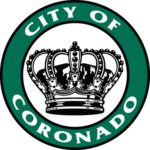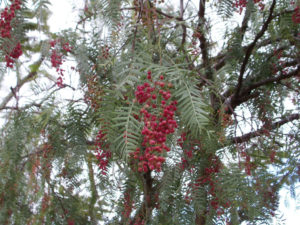 The city council agenda for Tuesday, January 17 includes a proposal to remove and replace 900 pepper trees, a wastewater treatment and reclamation plant at the Municipal Golf Course, and a new traffic signal system on the Silver Strand.
The city council agenda for Tuesday, January 17 includes a proposal to remove and replace 900 pepper trees, a wastewater treatment and reclamation plant at the Municipal Golf Course, and a new traffic signal system on the Silver Strand.
Pepper Tree Removal
Pepper trees were planted in the 1930s. Many are in poor condition and pose a risk to public safety. Last January a wind storm felled 27 trees at the Municipal Golf Course in two hours. If this had happened city-wide, it would be difficult, if not impossible, for public services to respond, the staff report contends.
 Besides being old and fragile, pepper trees have a number of undesirable features — invasive root systems that upend sidewalks and damage sewer lines, flowers and berries that are toxic, litter sidewalks and ruin vehicle paint finishes.
Besides being old and fragile, pepper trees have a number of undesirable features — invasive root systems that upend sidewalks and damage sewer lines, flowers and berries that are toxic, litter sidewalks and ruin vehicle paint finishes.
Originally the trees were planted because they were cheap, grew fast and need little water.
All 900 will not be removed immediately. Instead the city has created a management plan to monitor and evaluate the health on a case-by-case basis.
Wastewater Recycling
For a number of years, Coronado has been exploring the idea of building a wastewater recycling facility. In 2011 the city commissioned RFB to conduct a feasibility study.
It estimated that a recycling plant would cost approximately $12 to $14 million to build and $400 thousand per year to maintain. The facility would pay for itself in 20 years and could produce up to a half a million gallons of recycled water a day. That would be used to irrigate the golf course greens, city parks and mediums.
Besides saving water, the plant would allow the city to the “to demolish the existing, dilapidated and marginally functional Golf Course maintenance facility and construct a new facility, co-located with the reclaimed water facility,” and cons the staff report said.
It could also be ascetically pleasing. The low-profile structure could be designed to mirror the architecture of the club house. Technological advances would prevent pungent odors from wafting across the back nine.
Strand Traffic Signals
To alleviate early-morning gridlock in front of the Naval Amphibious Base, the council will consider a plan to install four adaptive crossing signals at Tulagi, Tarawa, Rendova and Avenida de las Arenas. Adaptive signals synchronize signal times to minimize traffic delays.
Meetings with Caltrans, who has jurisdiction over the highway, are underway to allow the city to install and maintain the signals. Before moving forward, the staff wants the city council to approve a prequalification process for potential contractors. This will ensure that only qualified firms will bid on the project.
This process was used for a number of projects, including the Glorietta Bay Master Plan, North Beach Restrooms and the Animal Care Facility.
The council meets at 4pm in the Coronado City Council Chambers, 1825 Strand Way.




